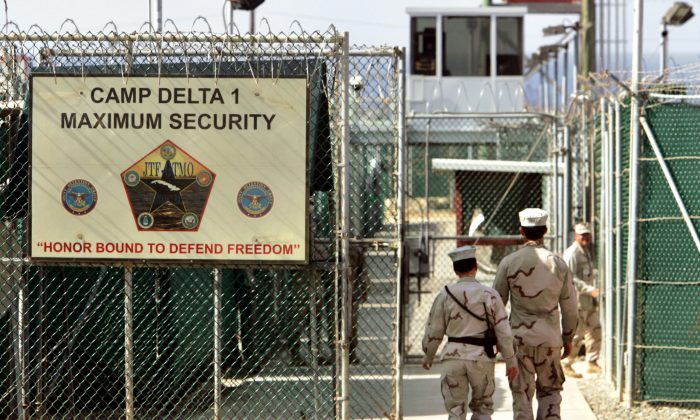By Ken Silva
The Biden administration declined to send an official to a Dec. 7 congressional hearing on the closing of Guantanamo Bay, drawing anger from both sides of the political aisle over the apparent lack of attention the administration is giving to the issues surrounding the offshore detention center.
The Senate Judiciary Committee hearing is the latest in a series of efforts by Sen. Dick Durbin (D-Ill.) to accelerate the process of closing the Guantanamo prison, which was opened in Cuba in 2002 following the 9/11 terrorist attacks. Durbin co-wrote letters with Senate Democrats to Biden and Attorney General Merrick Garland in April and July, urging them to prioritize the matter. He also introduced legislation to close the facility last week.
At the Dec. 7 hearing, the committee chair criticized officials for not responding to his letters and for declining to attend the hearing.
“I’m disappointed that the president and attorney general have yet to respond to my letters,” Durbin said. “And I’m disappointed that the administration declined to send a witness to testify at today’s hearing on how they are working to close Guantanamo.”
The Biden administration’s decision to skip the hearing didn’t just upset Democrats. Republicans were also critical of the administration’s absence from the hearing, saying that the lack of participation indicates that it doesn’t have a cogent plan for closing the Guantanamo prison.
“There’s not one member of the Biden administration on this panel. All of you are great Americans,” Sen. Lindsey Graham (R-S.C.) said to witnesses. “But I find it stunning that not one member of the administration would come before this committee to talk about closing Gitmo.”
Citing the chaotic withdrawal from Afghanistan in August, Sen. Chuck Grassley (R-Iowa) said he fears that the Biden administration may repeat that disaster if left to its own devices on Guantanamo.
“We watched this unfold in Afghanistan. … I fear that his plan to withdraw from the Guantanamo Bay detention facility is no different,” Graham said.
To date, 39 detainees remain at the facility, 27 of which haven’t been formally charged with any crime. Of those charged, none have trial dates, according to Marine Corps Brig. Gen. John Baker, chief defense counsel for the Military Commissions
“The 9/11 conspiracy was originally charged in 2008, almost 14 years ago, and as yet there is no date set to try that case,” Baker told the committee. “That the military commissions have been unable to bring the men charged with the worst criminal act in United States history to trial 20 years after the fact is alone enough to prove that the system has failed.”
Baker also said the military commissions have only produced one final conviction for Guantanamo detainees during the facility’s nearly 20-year existence.
“To be sure, there have been eight convictions, six of them by plea bargain,” he said. “Of these, three convictions have been overturned in their entirety, and three remain on appeal.”
Baker said discovery issues have been the main factor preventing Gitmo detainees from having their legal cases resolved. The government doesn’t want to disclose the torture that has taken place there, which has prevented defense teams from reviewing all of the necessary evidence.
“The Senate Select Committee on Intelligence Report on the CIA Rendition, Detention and Interrogation Program remains entirely classified, with the exception of the heavily redacted executive summary issued nearly a decade ago,” he said. “Despite the defense counsel having the necessary clearances to review it and a very pressing need-to-know, they have not been allowed access to it.”
While the witnesses and committee members were largely in agreement about the torture and abuses of justice that have taken place at Guantanamo, some still had reservations about closing the facility, due to national security risks.
Citing an assessment from the Office of the Director of National Security (ODNI), law professor Jamil Jaffer said an estimated 229 of the 729 detainees released have been confirmed or suspected of reengaging in terrorist activities. Five people who were released also hold high positions in the Taliban government, according to Graham.
Jaffer, the founder of the National Security Institute, said the fact that many of the detainees were captured on the battlefield complicates efforts to try them in the U.S. federal court system.
“A lot of evidence was gathered on [the] battlefield—there was no chain of custody,” he said.
The Heritage Foundation senior legal fellow Charles Stimson agreed with Jaffer about the lack of wisdom in releasing Gitmo prisoners.
“By resupplying them with their own fighters, it makes the war worse,” Stimson said.
But Durbin disagreed with the claim that roughly one-third of the people released from Gitmo are recidivists. He said the ODNI’s assessment often relied on single sources and hearsay and that it designated someone as a confirmed recidivist even if intelligence analysts were only partially certain of that fact.
“The DNI assesses that only 5 percent of detainees transferred since 2009 have been confirmed to reengage in terrorist activities. That’s 10 persons total, two of whom are now deceased. So the number’s five percent, not 30 percent,” Durbin said. “But even that number’s misleading, because it only takes a 30-percent likelihood that a detainee subsequently engaged in terrorist activity to count them as confirmed.”
Durbin noted that most of the recidivists were released by the Bush administration, before security processes were enacted to review detainee cases.
“According to the ODNI, 125 detainees have been confirmed with re-engaging in terrorist activities,” he said. “But the vast majority of those—115 of 125—were transferred during the Bush administration before today’s processes were put in place.”
As for a way forward, some witnesses suggested that plea deals be reached between the prosecution and defense attorneys.
“The government should prioritize negotiated resolutions of the remaining military commissions cases, rather than keep up the pretense of pursuing resolutions through contested trials,” attorney Katya Jestin said.
That’s what happened with Jestin’s client, Majid Khan, who was sentenced to 26 years imprisonment in October after reaching a pretrial agreement that could see him released as early as February. Khan earlier pleaded guilty to war crimes charges that included conspiracy and murder for his involvement in al-Qaida plots such as the deadly bombing of the J.W. Marriott hotel in Jakarta, Indonesia, in August 2003.
Khan had wanted to call witnesses regarding his torture and abuse by U.S. personnel as mitigation evidence at his sentencing, but his attorneys struck a deal to reduce his maximum sentence in lieu of calling those witnesses.
“Majid’s case demonstrates that such resolutions are possible,” Jestin said. “Negotiated resolutions would have to be knowing and voluntary, of course, and the details of negotiated resolutions would have to be worked out on a case-by-case basis, including concerning issues such as where and for how long defendants might serve their sentences.”
Baker said the plea deals won’t necessarily achieve justice for the terrorists or their victims—the time for that has long passed, he said—but they’ll allow the United States to close Gitmo and the related dark chapter in the country’s history.
Otherwise, most of the Gitmo cases will likely last another 15 to 20 years, or even longer when accounting for the appellate process, he said.






